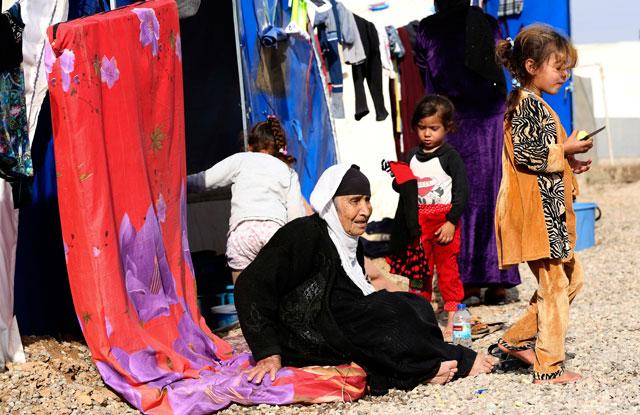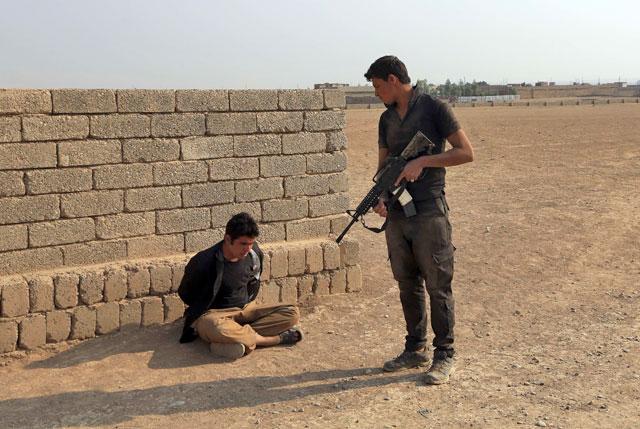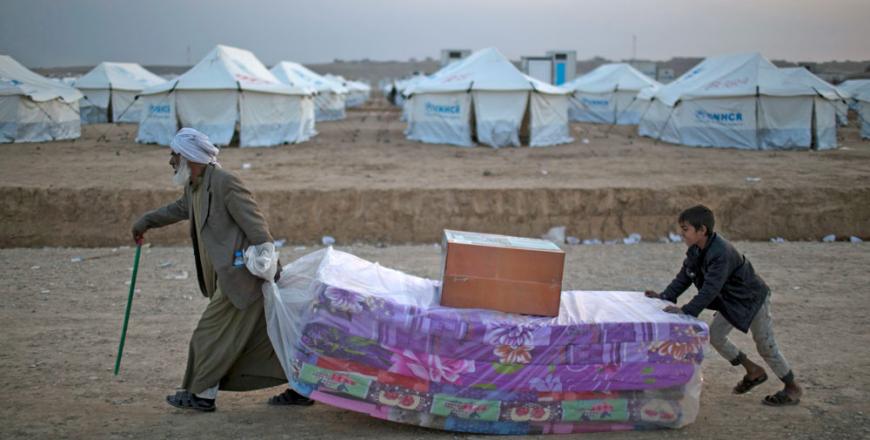You are here
UN refugee agency hands out aid to those uprooted from Mosul
By AP - Dec 05,2016 - Last updated at Dec 05,2016

Iraqis who fled the fighting between Iraqi security forces and the Daesh terror group militants settle at a camp for internally displaced people in Khazir, near Mosul, Iraq, on Monday (AFP photo)
KHAZIR, Iraq — The UN refugee agency distributed aid on Monday to dozens of Iraqi families uprooted from their homes in and around the city of Mosul, warning that their needs will only increase as winter progresses and temperatures continue to fall below zero.
UNHCR aid workers handed out kerosene heaters, jerry cans, plastic sheets and hygiene kits to about 30 families. Unlike in some areas inside Mosul where chaos erupted when hundreds of civilians overwhelmed aid trucks, the people lined up to get the aid in a camp in the town of Khazir, about 30 kilometres east of Mosul.
"We have received these items. But we need heating oil," said Haider Mahmoud Ahmed.
"They're here. Blankets, a heater, but we don't have water, drinking water. All the tankers around here are empty. There is no water in them. We want them to be filled so we can live," Ahmed added. "Yesterday we were freezing. There is no heating oil."
Some displaced are still haunted by what they experienced before leaving for the camp.
"It was raining mortars on us. There were snipers. And a rocket landed in the middle of the front yard. Inside the garage," said Abdullah Ahmed Saleh.
The UNHCR's senior public information officer, Caroline Gluck, said the aid items are part of emergency assistance "for families who've literally fled for their lives. Often most don't have anything apart from what they're wearing".
She added that temperatures during nighttime fall to below zero and "it's really tough for these families".
The families are among the nearly 5,500 people living in tents in a camp east of Mosul, where the battle to retake the city from the Daesh terror group is under way. So far, nearly 70,000 civilians have fled, according to UN
Inside eastern Mosul, civilians are cutting down trees and shrubs to use the wood for cooking and heating. While the area has largely been under Iraqi army control for nearly a month, electricity has not yet been restored and intermittent sniper fire and car bombs have prevented aid groups from delivering supplies to civilians trapped near the front lines.
Hundreds of thousands of civilians are estimated to still be inside Mosul, as the Iraqi government has encouraged residents to stay put to avoid massive humanitarian displacement.
Fathiya Isamii said her family survived the intense clashes with Daesh when Iraqi forces retook the Intisar neighbourhood only to have her son injured by a sniper round weeks after the area was declared liberated.
"He just took a few steps outside and was hit," she said, pointing to her home just a few blocks from a front line that hasn't moved for a month.
"We just want you to push them out," Isamii told an Iraqi army officer of the remaining Daesh militants.
Mosul, Iraq's second-largest city, is the last major Daesh urban bastion in the country. The battle for Mosul, started on October 17, is proceeding slowly as the presence of civilians means Iraqi troops cannot rely on heavy air strikes to clear terrain.
Iraqi army Sgt. Maj. Marwan Abbas said his unit has been unable to clear out the snipers because Daesh forces are constantly bringing in reinforcements. Daesh snipers are attacking from the roofs of homes in which civilians are still living and constantly changing their locations.
Iraqi forces are still working to fully surround Mosul and cut Daesh supply lines in and out of the city. In past operations against Daesh, long periods of isolation aimed at weakening the militant group preceded pushes inside urban centres.
US-led coalition air strikes have attempted to partially isolate the eastern half of Mosul by destroying four of the five main bridges spanning the Tigris River. But Iraqi commanders say the militants are still able to ferry supplies and fighters across the river in boats.
"Every day we kill some of them," Abbas said, flipping through pictures of mutilated corpses of suspected Daesh militants on his mobile phone.
"But all the time Daesh is sending more."
Related Articles
KHAZIR, Iraq — Daesh militants were shaving their beards and changing hideouts in Mosul, residents said, as a major Iraqi offensive moved ev
ERBIL — The United States said Thursday up to 900 Daesh extremists have been killed in the offensive to retake Iraq's Mosul, as camps around
SHAHREZAD, Iraq — Seif Mohammed, his nose cut and swollen, winced and held his back.














